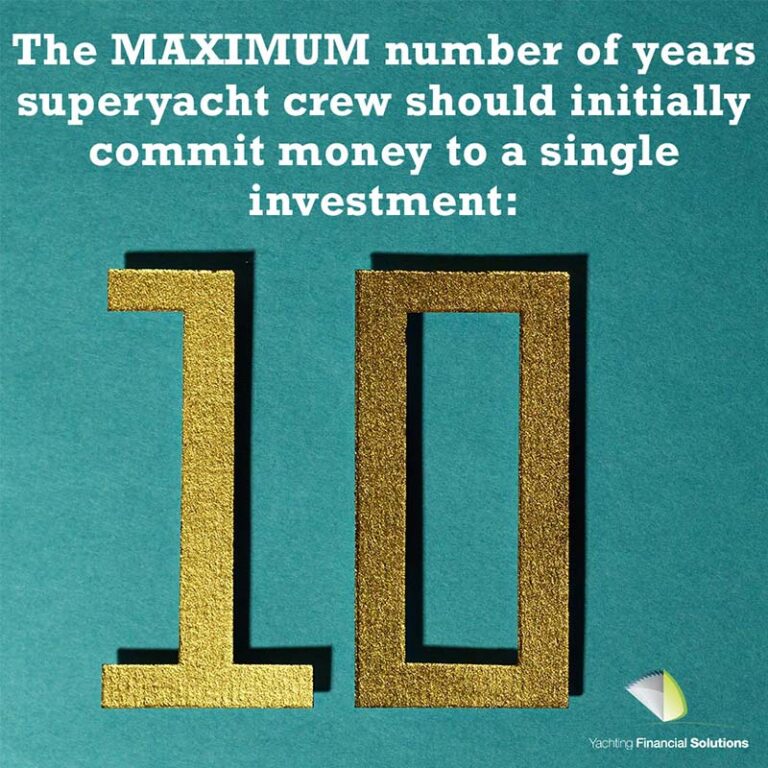Can You Manage Alone?

Putting together a solid financial plan that is flexible enough to adapt to your changing circumstances, yet solid enough to overcome temporary investment setbacks, isn’t an easy thing to do. That doesn’t mean you can’t do it on your own. Of course you can. But that begs the question, should you do it on your own and do you have the time?
Making an effective financial plan takes time. Partly because it should align with your life plan and partly because researching the right options is a time-consuming process. And you’ve got a demanding day job. Certainly during the key seasons of the year, yacht crew work long and intensive hours, leaving little time for anything else.
Drawbacks of going it alone
In addition to time pressures, there are a number of other considerations that might make it less appealing for you to manage your financial plan and investments on your own.
1. Lack of financial knowledge
Financial management involves making informed decisions about how to allocate resources, manage debt, invest for the future, and plan for your life after yachting. If you don’t have a basic understanding of financial concepts and principles, you may make decisions that are not in your best interest.
For example, you may be unaware of the different types of investments available and choose investments that are not appropriate for your risk tolerance or financial goals.
2. Complex financial situation
Any number of considerations can contribute to a complex financial situation. Not least of which is that you may not fall under a national, land-based tax regime due to your work at sea, ie. offshore.
Also, you might have multiple investments, several sources of income or existing debts to consider.
Often, working with someone can help you understand your financial situation and develop a comprehensive financial plan that takes into account all of your personal financial goals and priorities.
3. Emotional attachment
Emotion is one of the big reasons why people lose money when they invest. They might invest in the wrong thing, at the wrong time and (this may sound odd) with the wrong money—money they would have better been investing elsewhere.
Or they might panic when the markets take a dip. A common mistake is to take money out of investments rather than ride out the storm. Don’t forget, losses are theoretical until you crystalise them by selling your investment. (By the way, the same goes for profits.)
4. Forgetting to insure your income and planning for the worst
Often overlooked, proper financial planning includes developing a plan for maintaining your income if you fall long-term ill or the distribution of your assets should you die. It’s something you probably aren’t thinking about. Why would you? You’re still young. Nevertheless, it’s a grim fact of life that things go wrong
Working with a professional will help you put the right safeguards and plans in place should life throw you some unwanted curveballs.
Concerned about working with a financial planner?
So while managing money on your own can be a good choice for some, many find it more beneficial to work with a professional financial advisor. The right choice depends on your financial situation, goals, and priorities.
But not all financial planners are suited to everyone. It is vital that you find one you can trust and is interested in you and your goals.
Some people have concerns about working with financial planners. Let’s address some of the most commonly raised issues:
1. Cost
Financial planning services aren’t free. Some financial planners charge an hourly fee, but more commonly they are compensated via the product providers or as a percentage of the assets you invest in. Because a lot of the work they do is invisible, the fees charged by financial planners are sometimes considered to be high, but compared to what? Yes, the charges are more than doing your financial planning yourself. It would also be cheaper to do your own dentistry, but would you do that? Cheaper isn’t necessarily better. You tend to get what you pay for.
2. Lack of control
Yacht crew are by their very nature get-up-and-go kind of people. You’re used to getting on with it yourself. Obviously, some people prefer to manage their finances on their own and may feel uncomfortable delegating this responsibility to someone else. This is absolutely fine if you are very disciplined and a natural saver, but many aren’t.
3. Different investment philosophy
If you have a specific investment philosophy or approach, you may not find a financial planner who aligns with your beliefs. It’s important to work with a financial planner whose investment philosophy is compatible with your own.
4. Trust issues
A big one, for obvious reasons. Trust is an important factor when working with a financial planner. You have concerns about their honesty or transparency, perhaps based on what you’ve heard on forums. A key thing here is to separate fact from hearsay. And also be aware you are hearing only one side of the story. It’s always a good idea to investigate personally, not rely on hearsay.
5. Limited scope
Some financial planners specialise in specific areas or are tied to the financial products provided by one single institution. That means the choice of products they can offer is limited by that relationship.
What a financial planner can offer you
Although not for everyone, working with a responsible financial planner can be an extremely good idea. Yes, we know, we could say that, wouldn’t we? But hear us out. Working with a financial planner can provide several benefits to help you reach your financial goals.
1. Objectivity
A financial planner can provide an objective perspective and help you avoid making emotionally driven decisions with your money. For example, they can help you avoid impulsive purchases or investing in schemes that promise high returns but carry high risks when such investments aren’t appropriate for you.
2. Expertise
Financial planners have the knowledge, experience, and expertise to help you navigate the complex financial landscape and make informed decisions. They stay up-to-date on the latest financial regulations and market trends, which enables them to provide you with the best advice for your specific situation.
3. Comprehensive planning
A financial planner can help you create a comprehensive financial plan that takes into account all aspects of your financial life and your life plan. This includes savings, investments, insurance, taxes, estate planning, and retirement planning. With a comprehensive plan in place, you can be more sure that you’re not missing any critical pieces of the puzzle that could jeopardise your financial well-being.
4. Accountability
Working with a financial planner can help keep you accountable to your financial goals. They can help you track your progress and make adjustments to your plan as needed. They can also help keep you focused and motivated to reach your financial objectives. In fact, we created the YFSOL Partnership programme for this very reason.
5. Tailored advice
A financial planner can provide personalised advice that is tailored to your unique financial situation and goals. They can help you understand your risk tolerance and provide recommendations that align with your values and priorities. Risk tolerance is an important factor in the success of your financial plan. But without a proper understanding of risk and how it impacts your investment growth, you may end up sticking with a risk tolerance that isn’t suited to your circumstances.
6. Peace of mind
Knowing that you have a professional looking after your financial well-being can provide peace of mind. You can feel confident that you’re making informed decisions and that your finances are being managed properly and in partnership with you.
7. Long-term perspective
A financial planner can help you take a long-term perspective on your financial decisions. They can help you balance your short-term and long-term financial goals and make sure you’re on track to achieve them. And, critically, they have decades of experience.
At YFSOL, we have close to 80 year’s experience in-house and work with fund managers with even more experience. Key here is that we’ve seen it all before and we can help you understand how short-term and medium-term market conditions are likely to play out. Short-term circumstances are rarely a good foundation for long-term choices. Our experience is at your service.
Whether you decide to go it alone, or work together with a financial planner is a decision only you can make. Regardless of the choice you make, our best advice is that you stay involved with your financial plan, reviewing it regularly and making adjustments as necessary. And above all, let your financial plan and its associated investments be guided by your life plan.







